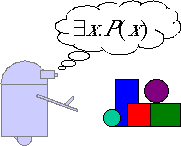
Learning Rich, Tractable Models of the Real World
MIT9904-09
Start date: 07/99
MIT AI Lab
Shigeru Katagiri
NTT
| Research Projects |  |
Learning Rich, Tractable Models of the Real WorldMIT9904-09 Start date: 07/99 |
Leslie Pack Kaelbling MIT AI Lab Shigeru Katagiri NTT |
Project summary |
|
This project will use limited first-order representation to construct efficient learning algorithms for complex domains.
Project description |

|
The everyday world of a household or a city street is exceedingly complex and dynamic, from a robot's perspective. In order for robots to operate effectively in such domains, they have to learn models of how the world works and use them to predict the effects of their actions. In traditional AI, such models were represented in first-order logic and related languages; they had no representation of the inherent uncertainty in the world and were not connected up to real perceptual systems. More recent AI techniques allow model-learning directly from perceptual data, but they are representationally impoverished, lacking the ability to refer to objects as such, or to make relational generalizations of the form: "If object A is on object B, then if I move object B, object A will probably move too." We are engaged in building a robotic system with an arm and camera (currently, in simulation) that will learn relational models of the environment from perceptual data. The models will capture the inherent uncertainty of the environment, and will support planning via sampling and simulation. |
Demos, movies and other examples |
The principal investigators |
Presentations and posters |
Publications |
"Learning Probabilistic Rules from Experience", Leslie Pack Kaelbling and Kurt Steinkraus, Research Note, January 5, 2000.
![]()
"Learning in Worlds with Objects", Leslie Pack Kaelbling, Tim Oates, Natalia Hernandez and Sarah Finney, Draft -- Please do not copy or distribute, December 13, 2000.
![]()
Proposals and progress reports |
Proposals:
NTT Bi-Annual Progress Report, July to December 1999:
NTT Bi-Annual Progress Report, January to June 2000:
NTT Bi-Annual Progress Report, July to December 2000:
NTT Bi-Annual Progress Report, January to June 2001:
For more information |